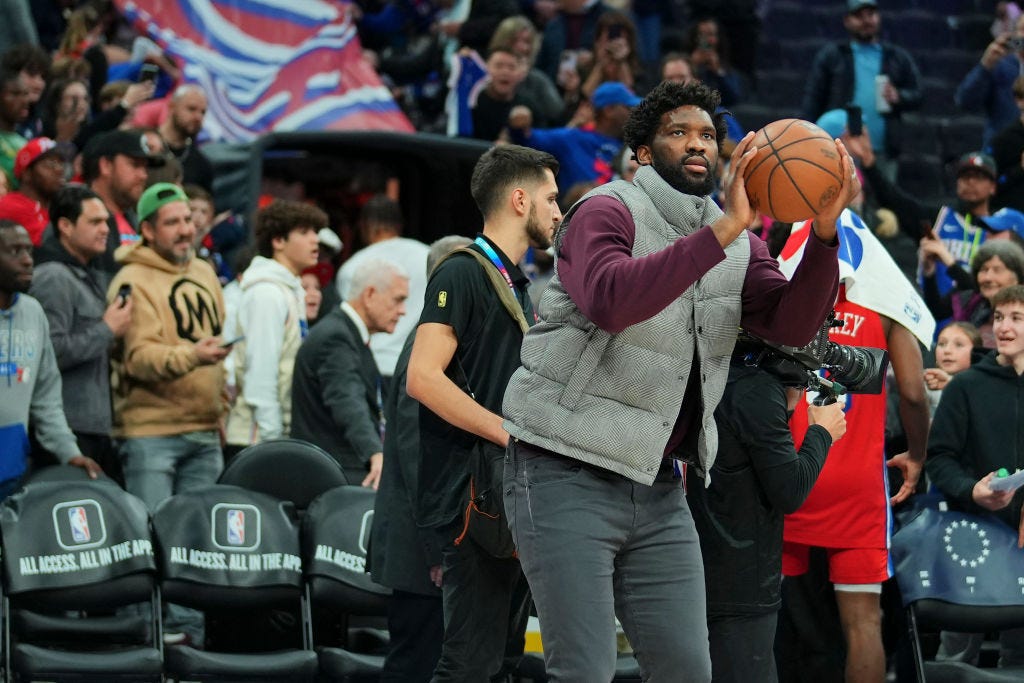The 79 Line and why Joel Embiid has all but conceded MVP
Which stars are in jeopardy of being disqualified for awards? Introducing a better way to gauge Star Award Eligibility.
I was baffled last Tuesday when I saw that Vegas bookmakers viewed Joel Embiid, along with Nikola Jokic, as the co-favorite to win the 2023-24 MVP award:
In previous years, Embiid’s name at the top would make sense. He averaged over 40 points in the entire month of December, and the Philadelphia 76ers have far exceeded expectations with James Harden gone.
After being +250 last week, Embiid’s odds have now lengthened to +600 behind Jokic, Shai Gilgeous-Alexander (my pick) and Luka Doncic in the MVP race, per DraftKings on Tuesday morning. Fueling that slide is the fact that Embiid himself expressed a disillusionment in becoming a repeat MVP after Monday’s game.
"It doesn't matter how many games I play; the goal is to be healthy the rest of the year," Embiid said Monday. “I've already [won MVP]. If I have a chance to get a second one, I'll do it. I'm not going to force myself or push for it. My game is always going to speak for itself. We're winning. That's the main thing. We've got to keep winning and you put in the stats to be in the [MVP] conversation that's great, too. But at the end of the day, if there's something going on, and I can't meet the requirement for the amount of games played to qualify for that, then so be it."
He knows the math. He’s on target to be NBA history’s first reigning MVP to be categorically disqualified from eligibility.
Before the season, as part of the NBA’s new collective bargaining agreement, the NBA and NBPA agreed to require a minimum 65 games played for MVP, Defensive Player of the Year, Most Improved Player, All-Defense and All-NBA recognition (with very narrow, small exceptions).
Embiid has missed 10 games. If he misses 18, he’ll be ruled ineligible for postseason awards. The reigning MVP is more than likely to miss the cut.
He’s not alone. To get a better grasp on a player’s award status, I’ve researched every star player’s standing against what I’ll call ‘The 79 Line.’ Why 79? That’s 65 divided by 82, or the percentage of games that a star would have to play in order to be eligible for the season awards (79.2 percent to be exact).
If a player is trending above 79 percent of games played, they’re on target to be eligible.
If they’re sitting below the 79 percent line, they better take their Flintstone vitamins.
I like The 79 Line better than saying something like, “Embiid has 8 games left!” because that doesn’t signal anything how many team games remain. Having only 8 hall-passes left on the card is a lot more dire if the calendar says “January” at the top as opposed to “March.”
I think there’s a simpler way to do it. If we know a player needs to maintain a 79% ratio of games played to be eligible, we can track if a player is currently on the right track.
And Embiid, as it stands now, is sub-79%.
So let’s run through the players using the guideline of the NBA’s definition of a star (a player who was named to All-Star or All-NBA player in the past three seasons). I’ve put an asterisk to a player that was not defined by the NBA as a “star” under the PPP but is in the conversation for a major award. (Sincere apologies if you don’t see Your Favorite Award Candidate listed below).
I’ve slotted them into four categories:
🤩 Safe (39 players)
😅 Barely 79% (7 players)
🚨 The Sub-79% (7 players)
🚫 Already DQ’d (7 players)
So, with The 79 Line in mind, let’s find out who’s makes the cut …




